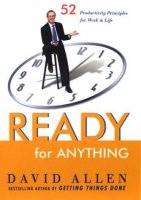 Ready for Anything: 52 Productivity Principles for Work and Life, by David Allen (Viking Penguin, 2003)
Ready for Anything: 52 Productivity Principles for Work and Life, by David Allen (Viking Penguin, 2003)
Having been so impressed by the ideas, if not the writing, of Allen's Getting Things Done, I was eager to read more. His latest book, Making It All Work, isn't yet available at our library, so I grabbed Ready for Anything.
As I began reading, I thought this would be a short review because there wasn't much new, that the book would be valuable as inspiration (very important!) but wouldn't add much to what I'm already working on. Now that I've finished, however, I know that this will be a short review because there is too much here, that there is much benefit I could reap by buying the book and taking time to work through the ideas and exercises. I'm not ready, as I'm still in the early stages of implementing the Getting Things Done ideas, but it will be a worthwhile later step. (More)
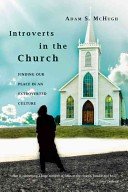 Introverts in the Church: Finding Our Place in an Extroverted Culture, by Adam S. McHugh (IVP Books, 2009)
Introverts in the Church: Finding Our Place in an Extroverted Culture, by Adam S. McHugh (IVP Books, 2009)
This isn't actually a review—yet. But this is clearly a book I need to read, so I've ordered it from the library despite my already intimidating "to read" list.
Adam McHugh was interviewed in the most recent Mars Hill Audio Journal, and I was hooked immediately. (Something like this happens every time I think about letting my Mars Hill subscription lapse.)
McHugh tells the story of one little girl who was astonished when mother commented that she was being awfully quiet—because it was anything but quiet in her own mind.
Introverts have constant activity going on in their heads; neurological studies have shown that the brains of introverts actually show more blood flow, more activity, than the brains of extroverts; this, it is speculated, is why they need less external stimulation. IN fact, they need solitude in order to be able to deal with all that neurological action, and if they don't get it, their brain chemistry becomes imbalanced.
So. Li'l Writer Guy is not my own invention, but the normal manifestation of an introverted brain. (More)
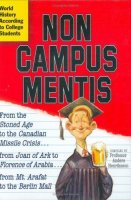 Non Campus Mentis: World History According to College Students, compiled by Anders Henriksson (Workman Publishing, New York, 2001) (Later retitled Ignorance Is Blitz)
Non Campus Mentis: World History According to College Students, compiled by Anders Henriksson (Workman Publishing, New York, 2001) (Later retitled Ignorance Is Blitz)
This compilation of major historical events was pieced together from the essays and exams of students at a variety of colleges in the United States and Canada. If you know a reasonable amount of world history and geography, you will find it hysterical, at least till you get to the quiz in the back of the book.
It would be a good book to read aloud at a party, although you would miss some pretty funny misspellings. Reading it aloud in the car, however, as we did, would be unwise: If you think texting puts the driver at a disadvantage, you should see what happens when he's doubled over with hysterical laughter. (More)
 Free-Range Kids: Giving Our Children the Freedom We Had Without Going Nuts with Worry, by Lenore Skenazy (Jossey-Bass, San Francisco, 2009)
Free-Range Kids: Giving Our Children the Freedom We Had Without Going Nuts with Worry, by Lenore Skenazy (Jossey-Bass, San Francisco, 2009)
Paperback subtitle: How to Raise Safe, Self-Reliant Children (Without Going Nuts with Worry)
I've been following (and blogging about) Free-Range Kids for quite a while now, so it's about time I finally read the book. First off, in case you don't bother to read the rest of this post: Get a hold of a copy of this book and read it. If you are tempted to dismiss the free-range movement as crazy, irresponsible parenting, this will reassure you. If you're already sold on this idea, it will open your eyes to how we got to the point of needing it.
Being so familiar with the Free-Range Kids blog, and even having made some contributions myself, I thought I knew what to expect from the book. Boy was I wrong. (More)
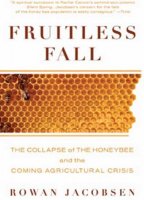 Fruitless Fall: The Collapse of the Honey Bee and the Coming Agricultural Crisis, by Rowan Jacobsen (Bloomsbury, New York, 2008)
Fruitless Fall: The Collapse of the Honey Bee and the Coming Agricultural Crisis, by Rowan Jacobsen (Bloomsbury, New York, 2008)
Fruitless Fall had been my "to read" list since mid-2009 and, thanks to generous family, on our bookshelves since Christmas. I loved Jacobsen's Chocolate Unwrapped, so why it took so long to begin this book is beyond me. Once begun, however, I couldn't stop, and finished it the same day. There are a few compensations for being sick and not having the energy to tackle much of anything else.
Speaking of feeling sick ... Fruitless Fall is scarier than The Omnivore's Dilemma, Food, Inc., and Everything I Want to Do Is Illegal combined. Or perhaps the effect is cumulative.
That's not to say the book isn't a delight to read, doing for honey and beekeeping what John McPhee's Oranges did for the citrus industry many long years ago. (I wish someone would write an update, as McPhee's book ends when frozen concentrate was king.) The overall theme is the recent precipitous and inexplicable decline of bees and beekeepers, with many side notes (some delightful, some frightening) along the way. (More)
 Christians Are Hate-Filled Hypocrites ...and Other Lies You've Been Told, by Bradley R. E. Wright (Bethany House, Minneapolis, 2010)
Christians Are Hate-Filled Hypocrites ...and Other Lies You've Been Told, by Bradley R. E. Wright (Bethany House, Minneapolis, 2010)
Frankly, my expectations were not high when I picked up this book. The title may be eye-catching, but for that reason it doesn't inspire confidence that there's serious writing between the covers.
There is, however, and serious research, too. Bradley Wright is a sociologist, a professor at the University of Connecticut. His words are aimed at the layman, not the academic, and he writes with a nice sense of humor; even so, the array of facts and graphs and studies is dizzying. (More)
Gustav Mahler's Symphony No. 2, "The Musician's Stimulus Package"
Okay, so that's not the name Mahler gave to this symphony, but he didn't call it "Resurrection," either, which is what usually shows up on concert programs, so I claim the right to my own title.
Last night was the Orlando Phil's season opening concert, consisting of but this one work. The ticket-takers thoughtfully warned us, as we entered, "Ninety minutes, no intermission!" causing an immediate run on the bathrooms. (More)
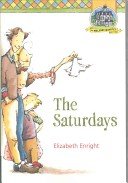

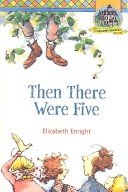

The Saturdays
The Four-Story Mistake
Then There Were Five
Spiderweb for Two: A Melendy Maze
by Elizabeth Enright (Holt/Square Fish, New York, 2008)
I've heard it said—and often by teachers—that it doesn't matter what children read, as long as they're reading. I couldn't disagree more.
Actually, there's just enough truth there to be dangerous: When one is learning to read, the very best path to the next level is merely to read, and read, and read. It doesn't matter if it's Dr. Seuss, Calvin & Hobbes, Star Wars, or Anna Karenina—almost anything will do that is decent and holds the reader's attention long enough for the practicing to work its magic. When my father was sick and terribly thin, we pressed upon him high-fat, high-calorie, high-sugar foods that would normally have been anathema to a sensible diet. (More)
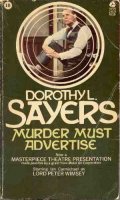 Murder Must Advertise, by Dorothy Sayers (Avon, New York, 1967)
Murder Must Advertise, by Dorothy Sayers (Avon, New York, 1967)
Dorothy Sayers is one of my favorite authors, both fiction and non-fiction, and her Lord Peter Wimsey mystery stories among the best of that genre. I've read them all so many times that quotations from them worm their way up from the depths of my brain unbidden, enabling me to appear knowledgeable in fields where my ignorance is nearly complete, as happened earlier this year while I was sitting in on a class about medieval manuscripts. (More)
 The Chronological Guide to the Bible (Thomas Nelson, Nashville, 2010)
The Chronological Guide to the Bible (Thomas Nelson, Nashville, 2010)
My review copy of this book arrived from the publisher at a fortuitous time: I happened to have recently begun reading Susan Wise Bauer's History of the Ancient World. Each book is good; together they are a great window on the historical and cultural settings for Biblical events.
The book meant to be read with the Chronological Guide, however, is the Bible, and I look forward to that adventure in the future. A Bible itself, arranged in chronological order, would be easier than flipping back and forth, but the Guide is small (not much over 200 pages) and easy to read even though dense with facts, works with any Bible translation, and lets the reader decide how to proceed in places where historical order is uncertain or controversial. It really is just a guide; you must do the work of actually opening the Bible yourself. (More)
 Everything I Want to Do Is Illegal: War Stories from the Local Food Front. by Joel Salatin (Polyface Inc., Swoope, Virginia, 2007)
Everything I Want to Do Is Illegal: War Stories from the Local Food Front. by Joel Salatin (Polyface Inc., Swoope, Virginia, 2007)
Until now, I've written more about Joel Salatin than I've read by him: almost a year ago in Strange Bedfellows? Not Really, and three months later in my review of The Omnivore's Dilemma. Wanting to correct that sin of omission, I grabbed the only one of his books available in our local library: Everything I Want to Do Is Illegal.
On every side, our paternalistic culture is tightening the noose around those of us who just want to opt out of the system. And it is the freedom to opt out that differentiates tyrannical and free societies. How a culture deals with its misfits reveals its strength. The stronger a culture, the less it fears the radical fringe. The more paranoid and precarious a culture, the less tolerance it offers. When faith in our freedom gives way to fear of our freedom, silencing the minority view becomes the operative protocol. — Joel Salatin
Salatin wants to opt out of a little more of the system than I do, but I hear his cry. You could call him bitter, but if you consider the miracle that is Polyface Farms, you have to wonder why our government is working so hard to stamp out such elegant, inexpensive, healthy, delicious, and truly "green" (in a conservationist sense) endeavors. (More)
Permalink | Read 5260 times | Comments (1)
Category Reviews: [first] [previous] [next] [newest] Politics: [first] [previous] [next] [newest] Children & Family Issues: [first] [previous] [next] [newest] Food: [first] [previous] [next] [newest] Conservationist Living: [first] [previous] [next] [newest]
I am republishing my initial comments, made in December 2008, when I checked The History of the Ancient World out of the library then discovered I didn't have time to read it. Now, nearly two years later, I have finally read the book, and my additional comments are added below.
 The History of the Ancient World: From the Earliest Accounts to the Fall of Rome, by Susan Wise Bauer (W. W. Norton, New York, 2007)
The History of the Ancient World: From the Earliest Accounts to the Fall of Rome, by Susan Wise Bauer (W. W. Norton, New York, 2007)
Despite having some initial negative reactions to Susan Wise Bauer, I've continued to find her work delightful and invaluable. (See my reviews of The Well-Trained Mind, The Story of the World, and The Well-Educated Mind.) I haven't read more than a small part of The History of the Ancient World, but borrowed it from the library in order to determine whether or not to buy it for myself. I've so enjoyed—and learned from—listening to Jim Weiss read The Story of the World, which was written for elementary-age children, that I wondered if Bauer could bring as much delight into a history book for adults. (More)
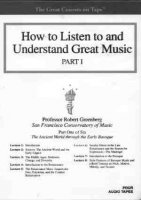
How to Listen to and Understand Great Music, by Robert Greenberg; a Teaching Company lecture
I've said it before: For accessible, serious, high-quality, adult-level educational materials (DVD, CD, mp3 download) it's hard to beat The Teaching Company. Robert Greenberg is one of my favorite lecturers, and this—so far—my favorite of his courses. (More)
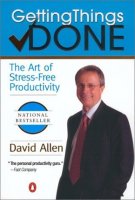 Getting Things Done: The Art of Stress-Free Productivity by David Allen (Penguin, New York, 2001)
Getting Things Done: The Art of Stress-Free Productivity by David Allen (Penguin, New York, 2001)
For now, I can't do any better than to refer you to Janet's review of Getting Things Done. I found it a difficult book to read, even unpleasant, because it's not well written, and makes my mind feel like a hamster on a wheel: running a lot but not getting anywhere.
But if Allen's book is disappointing, his ideas still inspire me—even if I did have to come at the ideas the wrong way around, from what other people have said about them. Most inspirational was seeing Janet's version of the system in action, though I know I would have gotten more out of her explanations—and maybe out of the book—if I'd attempted to implement some of the ideas myself, first.
The book wasn't nearly as much fun to read as Don Aslett's books on controlling clutter, but I think they have a lot in common. Getting Things Done is a lot about controlling the clutter in our minds.
"What's the next action?" The answer to Allen's favorite question is, "Implementation." But that's not really an answer, since "implementation" isn't a discrete action, but a mammoth project. I hope to accomplish some baby steps this week, and—eventually—report back on the results.
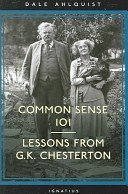 Common Sense 101: Lessons from G. K. Chesterton by Dale Ahlquist (Ignatius Press, San Francisco, 2006)
Common Sense 101: Lessons from G. K. Chesterton by Dale Ahlquist (Ignatius Press, San Francisco, 2006)
I tried to take a shortcut. With only three days before leaving the J&S Library behind, I chose this instead of a book by Chesterton himself. Although somewhat unsatisfactory, it was probably the right thing to do: The summary has left me thirsting for the Real Thing. (More)


